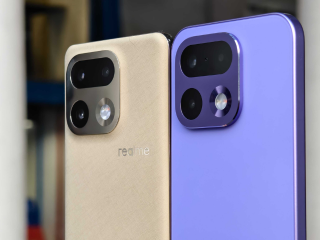- Home
- Laptops
- Laptops Reviews
- OnePlus Keyboard 81 Pro Review: Surprisingly Good
OnePlus Keyboard 81 Pro Review: Surprisingly Good
OnePlus’s first keyboard is a very strategically placed product in the growing mechanical keyboard market in India

The OnePlus Keyboard 81 Pro is priced from Rs 17,999 in India
OnePlus does not just make smartphones anymore and over the years, it has experimented and expanded its range of products. It now has a fairly wide ecosystem of devices, which recently also saw the addition of a tablet. From an ecosystem point of view, it is only missing a computer. Adding to this long lineup of smartphones, TVs, monitors, smartwatches, audio gear, clothing accessories (which also includes a fanny pack), is a mechanical keyboard called the OnePlus Keyboard 81 Pro. OnePlus tied up with the mechanical keyboard specialists at Keychron to design it.
While I will explain in detail as to why this keyboard is a bit different, like many others I also assumed that it was a rebadged Keychron Q1 Pro. The Q1 Pro is a unique offering as it offers the best of two product lineups — a premium full metal keyboard merged with the ease and convenience of wireless connectivity — giving one the best of both worlds. All of Keychron's Q-series premium lineup was only offered with a cable until then, which meant that buyers had to choose between a premium-looking and great sounding customisable keyboard, versus a plastic-bodied keyboard that's focussed more on connectivity and customisation.
After using the OnePlus Keyboard 81 Pro for more than a month, here's what I think of it.
OnePlus Keyboard 81 Pro price in India and box contents
The OnePlus Keyboard 81 Pro is available in two options which basically comes down to the type of what switch you prefer. There's the Winter Bonfire option which comes with PBT keycaps and tactile switches that oddly have red-coloured stems and is priced at Rs. 17,999. The Summer Breeze option is priced a bit higher at Rs. 19,999 and comes with a rather unique Marble Mallow keycaps (which are supposed to be flexible) and linear switches with stems that are strangely blue in colour. The option you choose is basically the name of the switch, which is a result of OnePlus' collaboration with Keychron.
![]()
The OnePlus Keyboard 81 Pro comes with usual cable, keycap and switch puller along with extra tools and spares, which is a nice touch
The colours chosen for the switches are a bit odd as the red colour of the Winter Bonfire switch is usually used to signify silent linear switches, while blue colour of the Summer Breeze switch is normally used to signify linear but clicky (read: noisy) switches. Switch makers usually go with brown for tactile switches. So, be careful what you select when you pick one as the colours are very misleading and are different from the standard colour coding for basic mechanical switches.
Apart from the usual keycap and switch puller, OnePlus has a quality braided USB Type-C to Type-C cable which can be used to connect the keyboard to your system for a much higher 1,000Hz polling rate (compared 90Hz with wireless) and a USB Type-A to Type-C adapter as well. Also included with the Keyboard 81 Pro is a hex key which matches the screws used on the case. OnePlus also throws in a few extra screws for the stabilisers and 4 extra gasket foam strips as well, in case they happen to wear out.
OnePlus Keyboard 81 Pro design
There is no real difference between the two keyboard options when it comes to cosmetic design. The only visual cues are the darker grey keycaps used on the alphanumeric keys, directional keys and some function keys on the Winter Bonfire option, which I received for review. The Summer Breeze option inverts the whole theme and uses light grey keys for the majority of the layout, leaving the dark grey keys for the remainder.
![]()
The colour scheme of the keycaps and case are typically OnePlus
Yes, I will agree that grey, white, and red are typically OnePlus colours and there's the bright red coloured keycaps on the escape key (with a OnePlus logo) and the enter key will remind many of OnePlus smartphones. But that's pretty much where the OnePlus branding fizzles out as Keychron too sells its Q1 Pro in a very similar-looking Shell White finish complete with red keycaps for the escape and enter keys.
While many may comment that OnePlus could have toned down its branding a bit, those who will end up buying the Keyboard 81 Pro might end up customising it with custom keycaps anyways and the basic aluminium (grey) case seems like a decent starting point for the same. But yes, I feel OnePlus could have gone with more contrasting colour options out of the box.
To me, the colours of the keycaps lend the keyboard a bit of a retro-modern feel. The customisable acrylic knob at the top right corner stands out a bit but thankfully, it does not have RGB. There's a chrome casing which surrounds it and the navigation keys makes it look very unique from anything that's currently out there when it comes to pre-built keyboards.
![]()
The Winter Bonfire option comes with PBT double-shot keycaps
While the wedge-shaped layout of the metal keyboard case is similar to the Keychron Q1 Pro with bigger overhangs with the top case on all sides, OnePlus adds a beautifully finished chrome fold out stand (with rubber stoppers) which it calls a ‘keyboard holder' at the back. It adds a classic touch to what is mostly a modern looking keyboard in terms of its overall appearance and is really useful for those who are looking for that extra incline as it can raise the height of the keys by an inch. The standard Keychron Q1 Pro does not have this feature. OnePlus calls it a keyboard holder because it lets the Keyboard 81 Pro stand up on its top edge helping declutter an office or work desk when you need that extra space.
The OnePlus Keyboard 81 Pro offers a proper 75 percent layout, so it is a big keyboard overall. However, given the larger overhangs on the top case, it almost feels as big as an 80 percent Tenkeyless (TKL) layout. Indeed, this is not a keyboard which was designed to go into a backpack. At 1.8kg it is quite heavy. But all of this heft is necessary to deliver that well-tuned typing experience which is targeted at those who are looking for a well-built pre-built keyboard to place on their desks and nowhere else.
OnePlus Keyboard 81 Pro performance
Since this is a fully-assembled pre-built keyboard, you can only choose between the two cosmetic options that are limited to two switch types when purchasing one. This is a contrast compared to the plethora of options Keychron offers with the Q1 Pro on its international website (since it's not available for purchase in India). The Winter Bonfire keycaps are the regular double shot PBT ones. They have a nice rough texture that avoids grease and remained shine-free during the review period during which I used it every day.
![]()
The Keyboard 81 Pro has a very practical 'keyboard holder' which doubles up as a fold-out stand to adjust the keyboard's incline
Since I use a mechanical keyboard (albeit a budget one) on a daily basis, it's easy to tell the huge difference between using a Keychron K6 (priced at Rs. 8,499 onwards) with Gateron G Pro Brown switches and a OnePlus Keyboard 81 Pro with its Winter Bonfire switches. Every keypress has a nice tactile feedback which is at the beginning of the keypress. The switches need a bit of force when pressing them down, but with a travel distance of just 3.3mm (2.2mm pre-travel), registering keypresses was pretty quick.
This also meant I could type quite fast and accurately. Given that these are custom-made switches, OnePlus has done a fantastic job with them, given it's their first go at building a keyboard and will hit the sweet-spot for many. Writers or coders will prefer tactile switches because of the tactile bump. However, if you don't prefer the tactile bump or the toned down clicky sound, do check out the summer breeze option which has quieter switches that are better suited for gaming because of their lower operating force and increased travel distance.
![]()
Our review unit came with the tactile Winter Bonfire switches
The switches are mounted on a PCB plate which is double-gasket mounted or suspended with foam-like gaskets to avoid making contact with the keyboard case. This reduces unwanted noise and vibrations. This keyboard uses 10 gaskets in all, five on either side of the PCB, and this along with the additional PC plate and case foam results in a toned-down and dampened clicky sound which I found quite satisfying and good for a pre-built keyboard. And if you aren't too happy with the sounds this keyboard produces, you can always hot-swap the switches with your favourite ones.
One detail I think OnePlus left out was a custom palm rest. I used a Keychron one which I had lying around at home. But I highly doubt it's possible to use the Keyboard 81 Pro without a palm rest given its height.
I'm not a big fan of south-facing RGB lighting and the OnePlus Keyboard 81 Pro, just like the Keychron Q1 Pro, has them. The PBT keycaps aren't of the shine-through variety so you will need an overhead lamp to light up the keyboard when working in a dark space. The lighting pattern presets can be toggled by pressing down the function key along with the ‘Q' key.
Colours of these patterns can be altered by pressing down function along with the ‘E' or ‘D' keys. The patterns seemed a bit limited compared to a regular Keychron keyboard, but these are all customisable using the VIA keyboard software, which will need your keyboard to be physically plugged into your machine when customising the lighting, macros and layers. The knob too is customisable. It defaults to increasing or decreasing system volume and can mute it when pressed down.
![]()
The mode selector button is fashioned like a OnePlus Alert Slider found on the brand's premium smartphones
There are also some subtle software tweaks included like a power saver mode which switches on after the battery gets exhausted and the keyboard cannot fire up the RGB lighting anymore. It's indicated by a blinking red light under the spacebar. The RGB lighting, although not as smart as Logitech's MX series keyboards, will turn off automatically after five minutes when not being used. Connectivity is quite solid and I used it wirelessly, connected to a Mac Studio during the review period. During this time it never disconnected, which is downright impressive for a third-party keyboard. The Keyboard 81 Pro can be connected to three separate devices, with switching done by pressing down the function key and 1,2 or 3 numeric keys.
Battery life is also quite solid for a wireless keyboard. The 4,000mAh battery lasted me six workdays (9 hours each) with RGB lighting fully lit and on maximum brightness. Beyond this the keyboard lasted two additional work days in power saver mode (sans backlighting) until it switched off. With the backlighting turned off, OnePlus claims that its keyboard will last up to 300 hours (or about 7.5 work weeks) on a single charge, which is still impressive for a regular RGB laden keyboard.
![]()
The multi-function knob apart from looking great also defaults to volume and mute functions
It's no competition when pitted against the Logitech MX Mini Mechanical we reviewed recently, which is priced similarly but comes with low-profile switches. The MX lasted two whole months on a single charge thanks to its sensor-equipped backlighting system with a basic white backlight. However the use-case for this keyboard is very different (portable and compact) compared to the Keyboard 81 Pro (desk work).
Since this keyboard will be sitting at your desk, delving into charging times seems pointless. Regardless, I still tested it out and it took a good six hours to fully charge when connected to a 65W PD GaN charger.
Verdict
When it comes to premium mechanical keyboards in India, you can either choose to settle for a pre-built one from a short list of manufacturers who officially sell them here, or you can choose the right parts, line-up for group buys, wait and finally assemble the keyboard of your dreams yourself. However, there's no guarantee that you will not cross the Rs. 20,000 mark to build that thocky or creamy-sounding keyboard.
The OnePlus Keyboard 81 Pro, like many other Keychron keyboards, is meant for those who want a mechanical keyboard for the typing experience, but don't want to get their hands dirty or dig-deep into the business end of it.
With that said, the OnePlus Keyboard 81 Pro sure finds itself in a very advantageous position in the Indian mechanical keyboard scene. That's because importing such high-end pre-built mechanical keyboards into the country is still quite the challenge. Keychron being the only premium mechanical keyboard manufacturer to offer a decent selection of its products in the country has also over the years garnered quite the following.
While Keychron is quite slow when it comes to releasing its new products in India, it almost seems like it purposely avoided launching its Q1 Pro keyboard out here because of this collaboration with OnePlus.
In short, you can either choose to import a Keychron Q1 Pro via the customs route (which may or may not work out depending on your luck) and you will end up with a keyboard customised to your tastes at a cost of roughly Rs. 16,500 (sans customs or duties). Or, you could simply go for its OnePlus-branded counterpart which can be purchased from Rs. 17,999. Thankfully, it isn't just limited to branding but also packs in some nice, unique upgrades (switches, fold-out stand, keycaps, design) as well.
I am quite impressed by what OnePlus has achieved thanks to inputs from its inner circle of testers and Keychron. What is also interesting to see is how OnePlus managed to design and create its own take of the Keychron Q1 Pro and also got most of it right in the first go, despite having no experience with building keyboards. In fact, I like this one so much, I can't wait to see what OnePlus pulls off with the next one!
Ratings out of 10
- Design: 9
- Performance: 9
- Value for money: 8
- Overall: 8
Pros
- Premium build quality
- Excellent typing experience
- Keyboard height is adjustable
- Useful keyboard holder or fold out stand
- Keys sound great
- Robust companion software
- Customisable keys
- Hot-swappable switches
- Replaceable keycaps
Cons
- Case is only available in one finish
- Could have included a custom palm rest
Catch the latest from the Consumer Electronics Show on Gadgets 360, at our CES 2026 hub.
Related Stories
- Samsung Galaxy Unpacked 2025
- ChatGPT
- Redmi Note 14 Pro+
- iPhone 16
- Apple Vision Pro
- Oneplus 12
- OnePlus Nord CE 3 Lite 5G
- iPhone 13
- Xiaomi 14 Pro
- Oppo Find N3
- Tecno Spark Go (2023)
- Realme V30
- Best Phones Under 25000
- Samsung Galaxy S24 Series
- Cryptocurrency
- iQoo 12
- Samsung Galaxy S24 Ultra
- Giottus
- Samsung Galaxy Z Flip 5
- Apple 'Scary Fast'
- Housefull 5
- GoPro Hero 12 Black Review
- Invincible Season 2
- JioGlass
- HD Ready TV
- Laptop Under 50000
- Smartwatch Under 10000
- Latest Mobile Phones
- Compare Phones
- iQOO Z11 Turbo
- OPPO A6c
- Samsung Galaxy A07 5G
- Vivo Y500i
- OnePlus Turbo 6V
- OnePlus Turbo 6
- Itel Zeno 20 Max
- OPPO Reno 15 Pro Mini 5G
- Lenovo Yoga Slim 7x (2025)
- Lenovo Yoga Slim 7a
- Realme Pad 3
- OPPO Pad Air 5
- Garmin Quatix 8 Pro
- NoiseFit Pro 6R
- Haier H5E Series
- Acerpure Nitro Z Series 100-inch QLED TV
- Asus ROG Ally
- Nintendo Switch Lite
- Haier 1.6 Ton 5 Star Inverter Split AC (HSU19G-MZAID5BN-INV)
- Haier 1.6 Ton 5 Star Inverter Split AC (HSU19G-MZAIM5BN-INV)

















